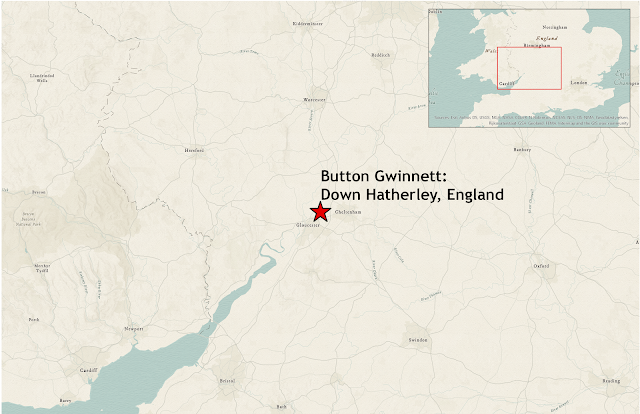Founding Fathers - Button Gwinnett
Button Gwinnett
Born: c. 1735 (Down Hatherley, England)
Died: May 19, 1777 (St. Catherine's Island, GA)
This week we look at one of the Founding Fathers who, quite frankly, seemed to struggle greatly at achieving much in the way of noteworthy success. Born on the outskirts of Gloucester in western England to a Welsh clergyman and his English wife, Samuel and Anne, Button Gwinnett's actual date of birth was never recorded. When he was baptized at St. Catherine's Church (remember that name, it will come up again later) on April 10, 1735, he may have been as old as three years of age. The young man's unusual first name came from an affluent relative named Barbara Button, who was his mother's cousin and became the godmother for her namesake. Button received a reasonably good education in Gloucester before moving to Bristol to begin a career as a merchant. While there he met and married Ann Bourne, the daughter of a business partner, and the couple had three daughters together. Button was unable to make much of his mercantile ventures, and by the time he was approximately 30 years old he decided a change of scenery was needed and opted to pursue his fortune across the Atlantic in the New World.
During the early part of the 1760s Button Gwinnett and his family arrived in Charleston, SC, which was the largest port city in the southern colonies at that time. His stay in that city was brief and unprofitable, and in 1765 he moved to Savannah, GA and purchased a coastal island. St. Catherine's Island (I told you the name would come up again) was close to the port of Sunbury and within 40 miles of Savannah, consisting of over 20,000 acres of woodland and salt marsh. Gwinnett purchased a number of slaves to establish a plantation, but once again met with only mediocre results. Among the residents of Sunbury, however, he befriended a man named Lyman Hall who encouraged his entry into politics. He was appointed Justice of the Peace in 1767, and by 1769 he won his first election as a representative in the Georgia Assembly. He continued to have financial struggles at home, however, and after losing most of his land and possessions in 1773 he left politics.
Rising tensions across the Atlantic soon changed everything for Button Gwinnett, however, and although he personally believed victory over the British military to be unlikely he nevertheless took action to support the establishment of colonial rights. Creating a strong coalition of coastal and rural supporters, he was chosen in 1776 to lead Georgia's militia but declined because of an uproar among the urban members of the Whig party who supported his rival, Lachlan McIntosh. Instead he accepted an appointment as a delegate to the Second Continental Congress alongside his friend Lyman Hall and George Walton, and they left for Philadelphia. Arriving in April, he participated as a strong supporter of independence and drew the praise of John Adams. After signing the Declaration in early August, he quickly left Congress and returned home to Georgia.
Button Gwinnett was again prevented from achieving his military goals by McIntosh, who had been given a commission by the Continental Army, but his supporters soon gained control of the assembly and elected him to be the body's Speaker in October. He helped construct a state constitution over the following months and effectively halted a plan by South Carolina to absorb Georgia. When the state president (governor) died in office a council was convened and named Gwinnett to fill the office, making him the acting executive head of the state and commander-in-chief of its military forces. He ordered Lachlan McIntosh, by then a brigadier general, to perform a failed invasion of British Florida and also arrested his brother, George McIntosh, on the charge of treason. McIntosh retaliated by insulting Gwinnett during his campaign to be re-elected, to which Gwinnett responded with a demand for apology or satisfaction. A duel was decided upon, and the two met at the small town of Thunderbolt. Using pistols at short range, both participants were wounded but McIntosh was able to recover. Three days after being shot, however, a gangrenous infection from a shattered leg caused Button Gwinnett to become the very first signer of the Declaration to pass away. For a number of years the location of his burial was disputed - some saying his remains were placed on St. Catherine's Island but had washed out to sea, others insisting that various cemeteries around Savanah held his grave. In the mid-20th century the bones from an unmarked grave were tested and accepted as the remains of Gwinnett, at which point they were placed beneath a marker in Savannah's Colonial Park Cemetery. Today, however, the patriot who had so much uncertainty surrounding his birth, his life, and his death finally found memorable success in an unlikely way. His signature, the most rare of all the Founding Fathers, has become the most prized and expensive in American history - with only 51 known examples of his signature in existence, collectors have set the value of just one authentic autograph at nearly $1 million.
The (valuable) signature of Button Gwinnett can be found as the first name on the first column beneath the Declaration of Independence.



Comments
Post a Comment